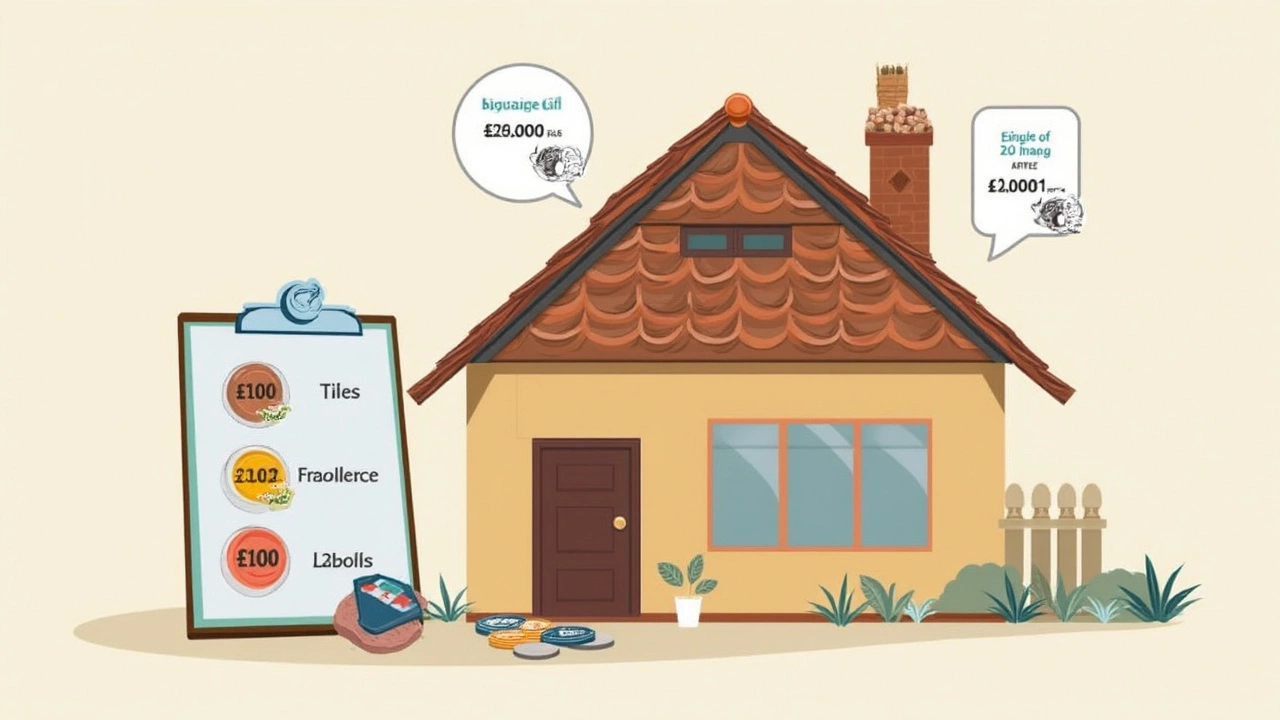If you've ever gotten a quote for fixing or replacing your roof, you've probably stared at the paperwork thinking, 'What exactly am I paying for here?' Roof payment is just the term for what and how you pay when you need anything done to your roof—simple as that. But wow, does it get confusing fast. There isn't a single price tag on a roof; it's more like a bill built from a bunch of moving parts.
Whether you own a tiny home or a sprawling place, the way you pay for roof work matters. Contractors usually want some of the money up front, and then you might pay the rest when the work is finished. Sometimes, companies offer payment plans, sort of like 'roofing layaway,' so you're not hit with a giant bill all at once. Figuring out what works best for your budget can make a big difference, especially if you've been blindsided by storm damage or a surprise leak.
- What Does Roof Payment Mean?
- Breaking Down the Costs
- How Roof Payment Plans Work
- Tips for Smarter Roof Payments
What Does Roof Payment Mean?
When you hear the term roof payment, it’s not about a regular monthly bill like rent or a car loan. It’s the money you hand over when you get your roof repaired or replaced. Think of it as the main transaction that pays for the materials, labor, and project management that goes into making sure you don’t have leaks or missing shingles.
The payment covers more than just the obvious stuff. You’re paying for materials like shingles or metal panels, the crew's time, any specialty gear, cleanup afterward, and sometimes even permits. Roofing companies aren’t just throwing up a few boards and calling it good—they’re building something that has to last through all kinds of weather.
Most of the time, you won’t be dropping the whole amount at once. Here’s what you can expect:
- Deposit up front: Usually 10-30% before work begins. This helps the contractor buy materials and book the job.
- Progress payments: For bigger projects, you might pay partway through the job—like after the old roof is torn off.
- Final payment: You hand over the rest after everything’s done and you’re happy with the work. Contractors should give you a final invoice laying out all the charges.
Roofing costs have been climbing. HomeAdvisor reported the average roof replacement in the U.S. runs about $9,000, but simple repair jobs might be as low as a few hundred. Location changes everything—a roof in the Midwest usually costs less than one in California.
If you're working with insurance after storm damage, the payment process can be different. Sometimes, your insurer pays the roofing company directly, or you might get a check to cover the job and pay the contractor yourself.
Just remember: every roof payment should match a detailed and written quote. Anything vague can come back to bite you later, so always ask for a line-by-line breakdown before signing anything.
Breaking Down the Costs
Looking at the bill for a roof repair or replacement can feel like reading a foreign language. The biggest thing to understand: your total roof payment is made up of several pieces. You’re not just paying for shingles or nails—there’s a lot under the surface.
- Labor: This is usually the priciest part. Skilled workers don’t come cheap. In the U.S., labor can make up 40% to 60% of a roof replacement cost.
- Materials: Asphalt shingles are the most common, but if you’re going for metal, tile, or a designer look, expect to pay more. For example, asphalt can run about $100 per square (a 10x10 foot area), while metal might cost $300 or more per square.
- Removal & Disposal: Ripping off that old roof and hauling away debris isn’t free. Contractors often add this as a separate line item—don’t be surprised if it’s a few hundred bucks or more.
- Permits & Inspections: Most cities require a permit for roof work. Depending on where you live, this could add $200-$500 or even more.
- Extras & Upgrades: Things like waterproof shields, new gutter covers, or better ventilation will spike up your total. If your roof has a tricky pitch or tons of angles, the price goes up too.
To make these costs clearer, here’s a quick look at what an average homeowner in the U.S. might see on a typical roof payment breakdown for a standard 2,000 sq. ft. asphalt shingle roof:
| Cost Component | Typical Range |
|---|---|
| Labor | $2,500 - $5,000 |
| Materials | $2,000 - $4,000 |
| Old Roof Removal | $600 - $1,500 |
| Permits & Misc. | $300 - $800 |
Keep an eye out for surprise fees. Some roofers throw in charges for things like hauling away extra shingles or even cleaning up your yard. Always ask for a detailed quote before you say yes to anything.

How Roof Payment Plans Work
Saw a sky-high quote for a new roof and thought, 'Yeah, no way I can pay that all at once'? That's where roof payment plans come in. They break down the total cost so you’re not emptying your bank account in one go. Here’s the deal: nearly every decent roofing contractor offers some kind of payment plan or financing option these days.
So, how do these plans actually work? First, you pick out the option that fits your finances. Most companies are happy to walk you through it because they know not everyone has a stash of cash just sitting around for emergencies like this. Common setups are:
- Split Payments: Pay a chunk (usually 20%-50%) before work starts and the rest when it’s finished. This plan is the most common because it protects both you and the contractor.
- Monthly Financing: Spread payments over several months or even years. Some roofing companies team up with lenders, so you might get offers like ‘12 months, zero interest’ if your credit is decent.
- Deferred Payments: Start paying a few months after the job is finished. Handy if you’ve got insurance claims in progress or need time to move money around.
Fun fact: According to a HomeAdvisor 2024 survey, over 70% of homeowners use some form of payment plan for roof replacement or repair because the average cost for a new roof in the US sits around $10,000, but can run up to $25,000 or more for big houses or fancy materials. Check out this quick price rundown:
| Roof Size | Average Cost |
|---|---|
| Small (1,000 sq ft) | $4,500 - $7,000 |
| Medium (2,000 sq ft) | $8,000 - $13,000 |
| Large (3,000+ sq ft) | $12,000 - $25,000+ |
Heads up—borrowed money comes with interest, unless you score a 0% promo deal. Always ask about the rate, hidden fees, and read the fine print before signing up. And don’t be shy about comparing offers between companies. Sometimes the savings are real, especially if you’ve got good credit or just need roof repair instead of a full roof replacement.
Tips for Smarter Roof Payments
A new roof or big repair isn’t pocket change. Good news? You can make smart moves to save cash and stress. Here’s the real deal on handling your roof payment better, straight from what works for homeowners.
- Get Multiple Quotes. Don’t say yes to the first contractor. Ask for at least three quotes. You’ll probably see big price differences—sometimes as much as 25%. This makes it easier to spot high or suspiciously low offers.
- Double-check What’s Included. Roofing contracts can be sneaky. Make sure yours lists everything: materials, old roof removal, disposal, clean-up, and warranty details. If something’s not listed, you might get surprised with extra fees later.
- Negotiate Your Roof Payment Schedule. Most jobs need a deposit—usually 10%-30%—but you don’t have to pay it all upfront. See if the contractor will let you pay in chunks: a deposit, one midway, and the rest after you’re happy with the work. This keeps everyone honest.
- Ask About Roof Payment Plans. Not everyone has thousands stashed away, and roofing companies know it. Many offer no-interest or low-interest payment plans, especially for creditworthy folks. Double-check the fine print so you don’t end up paying way more over time.
- Check for Insurance and Warranties. If your repairs are storm-related, see if your home insurance helps with the roof payment. Also, check if the job includes a workmanship warranty and a manufacturer’s warranty on the shingles or tiles—it’s written proof you’re not risking your money.
Take a look at the average costs below if you want to be extra prepared before starting:
| Type of Roofing Service | Typical Price Range (USD) |
|---|---|
| Basic Repair | $300 – $1,200 |
| Extensive Leak Fix | $1,200 – $3,000 |
| Full Roof Replacement | $6,000 – $18,000+ |
The final tip: never pay in full until it’s done. Hold back a chunk of your roof payment (around 10–20%) for the final inspection. Once the work looks right and your yard is clean, then you can hand over the last payment. You avoid hassle, and the job actually gets finished the right way.





